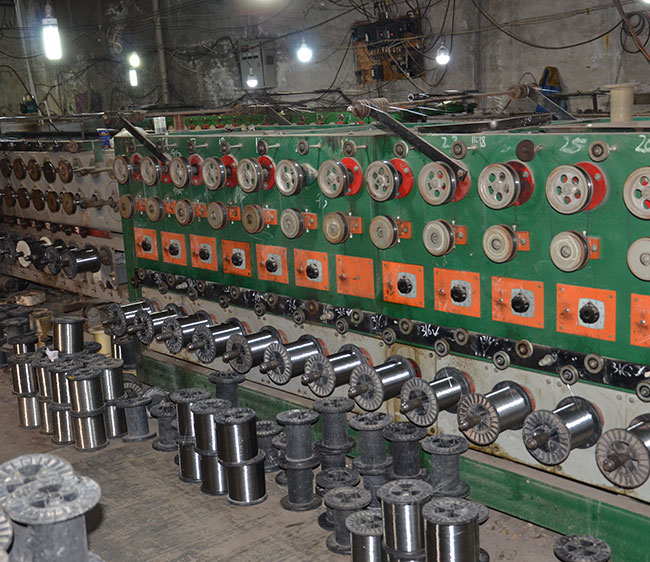nov . 25, 2024 03:40 Back to list
Optimizing Data Filtering Techniques with Mesh Networks for Enhanced Performance
Understanding Filter Mesh A Key Component in Filtration Technology
Filter mesh is an essential element in many industrial and domestic filtration systems, playing a crucial role in the separation of solids from liquids and gases. Its application spans across various fields, including wastewater treatment, food and beverage processing, petrochemical industries, and even in household appliances like coffee makers and air purifiers. Understanding the properties, types, and uses of filter mesh can enhance efficiency and effectiveness in different filtration processes.
What is Filter Mesh?
Filter mesh is a fabric made from a variety of materials—such as stainless steel, nylon, or polyester—designed to trap particles while allowing the passage of fluids or gases. The mesh is characterized by its pore size, which determines the size of particles it can filter out. The selection of the appropriate mesh depends on the filtration requirements, including the size of the particles to be removed and the type of fluid involved.
Types of Filter Mesh
There are several types of filter mesh, each suited for specific applications. Some common types include
1. Woven Wire Mesh This type consists of interlaced metal wires, forming a sturdy yet flexible structure. It is often used in industrial applications due to its durability and resistance to high temperatures and pressures.
2. Synthetic Mesh Made from materials like nylon or polyester, synthetic mesh is lightweight and often more cost-effective. It is frequently used in food processing and water filtration applications due to its resistance to corrosion and lower weight.
3. Non-Woven Mesh This type is produced by binding fibers together through heat or chemicals. Non-woven meshes are often used in applications requiring high filtration efficiency and are common in medical and hygiene products.
4. Perforated Plate Mesh This consists of a solid plate with holes punched through it, combining both filtration and structural integrity. It is commonly used in applications where a sturdy support is needed alongside filtration, such as in gas and liquid filtration systems.
Applications of Filter Mesh
The diverse range of filter meshes allows for various applications across multiple sectors
filter mesh

- Water Treatment Filter meshes are vital in municipal and industrial water treatment plants, where they help remove larger particles and sediments from raw water sources before further purification processes.
- Food and Beverage Processing In the food industry, filter meshes are used to strain juices, clarify wines, and ensure product consistency by removing unwanted solids. They are designed to meet stringent hygiene standards, ensuring food safety.
- HVAC Systems In heating, ventilation, and air conditioning (HVAC) systems, filter meshes capture airborne particles, dust, and allergens, contributing to improved air quality in residential and commercial spaces.
- Pharmaceuticals In the pharmaceutical industry, filter meshes are crucial for sterile filtration processes, ensuring that products are free from contaminants that could compromise safety and efficacy.
Factors to Consider When Selecting Filter Mesh
When choosing the right filter mesh for a specific application, several factors should be taken into account
- Pore Size The mesh's pore size should match the size of particles you aim to filter out. A smaller pore size provides finer filtration but may require more frequent cleaning or replacement.
- Material Compatibility The chosen material must be compatible with the fluids being filtered to prevent chemical reactions or degradation.
- Flow Rate The mesh should allow for the required flow rate while effectively trapping particles, balancing filtration efficiency and system performance.
- Temperature and Pressure Certain applications may require filter meshes that can withstand high temperatures and pressures, thus necessitating materials that demonstrate durability under such conditions.
Conclusion
Filter mesh is an indispensable component in various filtration systems, providing efficiency and reliability across multiple industries. By understanding the different types of filter mesh and their specific applications, industries can optimize their filtration processes, resulting in better product quality, enhanced safety, and improved operational efficiency. As filtration technology evolves, innovations in filter mesh design and materials will continue to play a pivotal role in meeting the growing demand for effective filtration solutions.
share
-
High Flow Water Filter Cartridge – Superior Filtration & Easy Replacement Hi Flow Water Filter Replacement Cartridge & Aqua Flow 50 Filter Cartridges
NewsJul.04,2025
-
Premium Window and Door Mosquito Net – Effective Insect Protection for Your Home
NewsJul.04,2025
-
Premium Stainless Steel Netting Mesh Discount & ODM Stainless Steel Wire Mesh Solutions
NewsJun.24,2025
-
High-Quality Screen Stone for Modern Stone Screen Walls Elegant Facade Solutions
NewsJun.10,2025
-
High Quality Wire Filter – Cheap Stainless Steel Filter Wire Mesh Cloth & Wire Mesh Filter Solutions
NewsJun.10,2025
-
5 Micron Water Filter Cartridge - Premium Sediment Filtration, Universal Fit
NewsJun.10,2025

